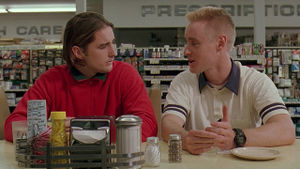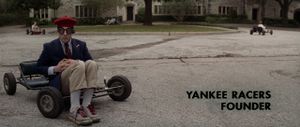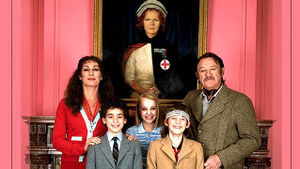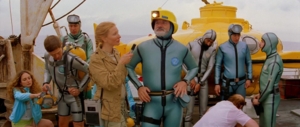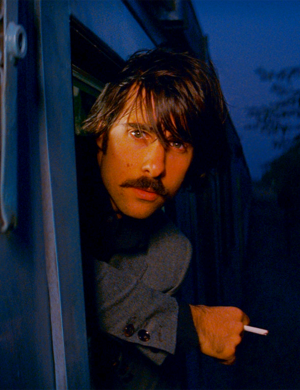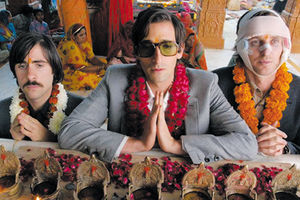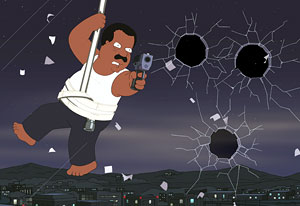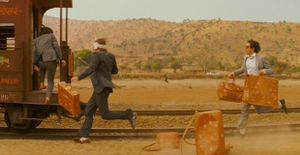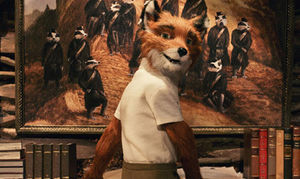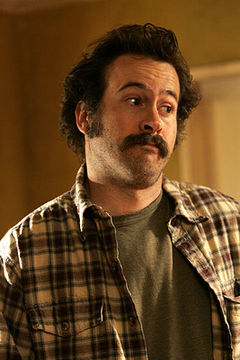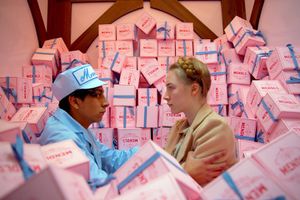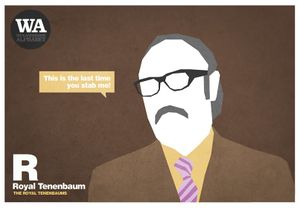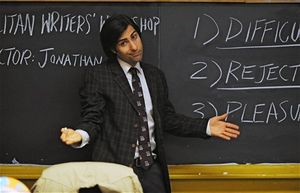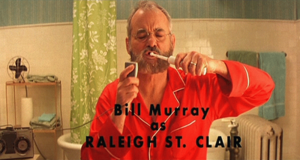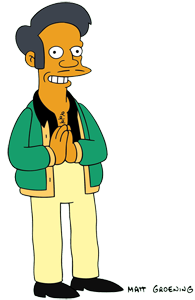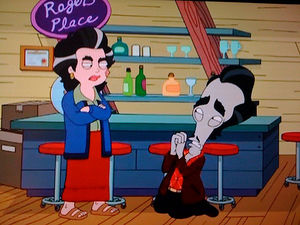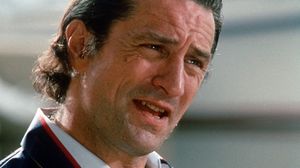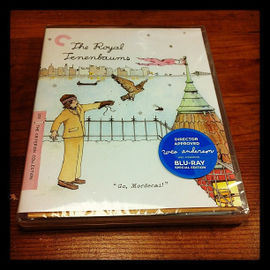Wes Anderson
WES ANDERSON
is an American director, famous for his films
Rushmore, The Royal Tenenbaums and Moonrise Kingdom
as well as his close working relationships with actors such as
OWEN WILSON
LUKE WILSON
JASON SCHWARTZMAN
ANJELICA HUSTON
WILLEM DAFOE
WARIS AHLUWALIA
JEFF GOLDBLUM
and
BILL MURRAY.
One must take into account that while many of his films have similar motifs and styles, they are all at the same time very original and all their own.
This article was written in partnership with Roman Coppola.
Biography
[Obscure European music from the '60s plays in the background.]
Wes Anderson was born on May 1, 1969, in Houston, Texas, one of three sons, the other being artist Eric Chase Anderson and an unnamed other. His father was estranged and his mother was religious. Eventually, his mother decided to become a nun and when his father died, his mother couldn't come to the funeral as she was too busy fixing this church in a remote village somewhere in Northern India. Some say this incident was the inspiration behind the Darjeeling Limited, but I digress.
People say that he was inspired by film when he went to college. Others say no. I think he got the idea when he was a security guard and he had an obsession with putting everything in the store in a certain way so the objects on his tiny TV screen wouldn't be a total eyesore.
Filmography
Bottle Rocket
This film was Anderson's first, released in 1996. It was phenomenal for many reasons. Not only did it put Wes Anderson on the map but also the Wilson Brothers.
It's a little hard to describe the greatness of this film. It is among the best of directorial debuts. Sure, it's no Citizen Kane, but what is besides Citizen Kane?
So, instead of futilely attempting to describe it aesthetically, I will describe instead through a plot synopsis. Luke Wilson plays a man in a stress clinic named Anthony. His friend, Dignan, helps him to escape, not escape is a definable concept. Anthony's dumb little sister doesn't know the difference between a stress clinic and a loony bin. Dignan later shows Anthony the 75-year plan. It's brilliant. You'd have to get the Criterion Collection copy of Bottle Rocket to see the full plan because it's pretty detailed. If you don't have internet (how the hell do you not?) then you can just do like Dignan and Anthony and get a copy of the 75-year plan by doing what they do in the next sentence. Dignan and Anthony rob a bookstore. Then they, like Harry Dean Stanton, go wandering through the Texas landscape. Along the way, they stop at a motel where Anthony enters into a romance with a Paraguayan maid named Inez. Eventually they have to leave and they rob from a safe at a storage facility. However, the plan turns out to be flaky. Dignan gets caught, arrested and later gets amnesia due to the blow to his head from police brutality. But it's funny amnesia.
Another reason this film is important is because it gives Paraguay one of its rare glimpses of fame, since before then people just assumed it was a South American country filled with lots of anthills.
Rushmore
Wes Anderson's second film was Rushmore, which was the one that lifted Anderson from some guy you might have read in the newspaper to "Holy shit Wes Fucking Anderson is the fucking shit." Also, it's one of my film teacher Mr. Jackson's favorite films and we watched it as homework. Easiest homework I ever got.
The story focuses on a snobby kid Max Fischer, played by a young Jason Schwartzman, who is a playwright and leads a bunch of unsuccessful clubs at a private school. He is pretty smart for a 15-year-old, but he's stuck up, a loner and kind of a douche. Not Kanye douche-y, but a douche nonetheless. Funny thing is we all know a bunch of douchebags, which is what makes this story so relatable. Anyway, after he gets into a fight with the principal, he gets expelled. This one man named Herman Blume does still admire him even though Max no longer goes to the school he teaches at.
Max finds relief in the new school, as he becomes accustomed to the people's ways of life. However, Max falls for this teacher Ms. Rosemary Cross, who he tries to do but as Dikembe might put it, "No no no, not in my school." And much in the same way Dikembe shot blocked basketballs, Ms. Cross cock blocked Max. Of course, news of this spreads around real quickly, thanks to a Scottish kid.
Blume meets Max's father, who he assumed was a neurosurgeon, but was actually a barber. Although some bad barbers do reach into the brain. He also learns that his mother died in 1989, which I can understand is sad. I can't relate to having a mother who died in 1989, but I can relate to having a mother who died.
But all is all that ends well. As is such the case in many Wes Anderson movies. Max writes a play that relates to his struggles yet is indirect, but all those involved know. Trust me, they know.
So. Rush Fucking More!
The Royal Tenenbaums
["Needle in the Hay" by Elliott Smith plays in the background.]
After the beloved and lighthearted Bottle Rocket and Rushmore, Wes Anderson decided that he was famous enough to make things a little edgier, and as a result, he created what many call his magnum opus, The Royal Tenenbaums.
This film focuses on the Tenenbaum family, as seen through the eyes of Alec Baldwin, and the best months of their lives. Patriarch Royal Tenenbaum (Gene Hackman) fakes having cancer so he can make a surprise visit to his family, three children (two boys, one girl, the two boys are his, the one girl was adopted from a family of rednecks in Tennessee or maybe they were aliens from space) and his estranged wife Etheline (Anjelica Huston), who is dating this new guy played by Danny "I'm getting too old for this shit" Glover.
His three children were as follows: Chas (Ben Stiller), who was a businessman and a math genius at a young age but is now an anally retentive fire drill enforcer due to an unfortunate incident with his wife (she died in a fire, she didn't die from slipping on a puddle if that's what you were thinking); Richie (Luke Wilson), a former tennis pro and artist; Margot (Gwyneth Paltrow) is, get this, a playwright. Margot is now a recluse who spends most of the day in a bathtub while watching TV and covertly smoking. Her husband is neurologist Raleigh St. Clair (not a neurologist Raleigh St. Clair Hospital), who conducts an experiment on this child with no memory or understanding of spatial reality. Margot is missing a finger due to an incident when visiting her real parents at age 14.
With the help of his faithful old Indian friend, Pagoda — go ahead, get it all out of your system now. Ahem. Like I was saying, with the help of his faithful old Indian friend, Pagoda, Royal manages to keep the falsity of his cancer a secret, and has the time of his life with his family, including the two grandchildren, who are fun, fun, fun boys.
Needless to say, Glover finds out Royal was faking it all, which only he could spot since Gene Hackman can keep a straight face due to his training as a serious actor, as evident through his portrayal of a paranoid fuck in the Conversation. Therein, Royal has to leave. Does the family go to hell without him? ... Is Nicolas Cage absolutely bonkers in Deadfall?
Raleigh finds out that Margot was a hussy back in the day. Richie attempts to commit suicide. Royal of course comes back to save his children's lives at Henry (the Glover fellow) and Etheline's wedding.
This dramedy has a bittersweet ending. Margot, owing a debt to Royal, releases a play about the family, which everybody loves. However, Royal dies (not during the play, but shortly afterward). However, everybody in the Tenenbaum family owes their debt to him (again with the owing of the debt). They love the regal Royal fellow! Hey, now I get the title!
The Life Aquatic with Steve Zissou
This movie is viewed as a giant inside joke and is therefore its fandom is split into two dramatically different groups of people: those who loved it and those who hate it. It is geared toward some people but not some others.
The story stars Bill Murray as Steve Zissou, a disgruntled American version of Jacques Cousteau. His epicness is obvious the second he shows up on screen as he is standing shirtless in front of a camera on a windy day, a clear sign that he — like any great antihero in movies — doesn't give a shit. He is on a search of revenge for the possibly nonexistent jaguar shark that killed his friend. Along for the fun is an unusual set of characters, including Pelé dos Santos, a Brazilian musician who sings David Bowie songs in Portuguese, a topless script girl, a frogman who can hold his breath for 7 minutes, 38 seconds, a physicist who doubles as a score composer and Klaus Daimler (Willem Dafoe), his second-in-command who is a former bus driver and is "calm, collected... German." He has seven college students who join him on his expedition as prostitutes in a way, as they joined him on his zany studies for credits.
While setting out to kill the jaguar shark, Steve Zissou meets a southern gentleman named Ned Plimpton (Owen Wilson), who he believes may be his son. Awestruck, Zissou walks by himself epicly to the sounds of "Life on Mars" by David Bowie. Zissou accepts him. Later, at Zissou's estate, Zissou adopts Ned, and asks Ned to change his last name from Plimpton to Zissou, and also Steve thinks his first name should be changed to Kingsley. Kingsley Zissou, has quite a ring to it, doesn't it?
A British female reporter played by Australian actress Cate Blanchett joins in to discover the real world of Steve Zissou. She is pregnant and doesn't swear since she wants to break out of the habit before she has her "fucking baby!" Unfortunately, both Plimpton and Zissou want her but, as polygamy is no longer the norm in this 21st century society, only one of them can.
The ship gets raided by pirates, and Zissou has to go crazy and fight their asses to Iggy Pop and the Stooges' "Search and Destroy." The stupid fuckers Operation Hennessy drop by for a visit because they're onto Zissou's game — the fucking terrorists — and one of their interns asks Zissou where he got this three-legged dog, affectionately nicknamed Cody. Since one of the university students died in the piracy of the ship, there has to be a calling wherein those who want to quit step forward and those want to stay, stay back. Klaus gets confused and accidentally crosses the line, mistakenly thinking that means "stay with him." He gets emotional — as emotional as a German can get, that is — and apologizes, and then asks to start over. Things go downhill. And I just thought about something. You know how the German guy's name is Klaus? Well, once for a law assignment, I was asked to play this doctor in a wrongful death lawsuit involving faith healers. The doctor's name was Dr. Do-Good, and since Do-Good is one of those doctor names like Strangelove, I thought I should make him one of those quirky German doctors and give him a faux German accent. I also made Dr. Do-Good's first name Klaus. People were surprised because I didn't tell anybody. And since my German accent was so convincing, I was switched back and forth between being called Dr. Do-Good and Mr. Klaus. And since my German accent was so convincing, my law teacher congratulated me and said that I sounded just like this German guy he knew. Hooray for me! Anyway, back to the story.
Steve Zissou makes a visit to his estranged wife Eleanor and she helps him out with something. They make a rescue Lightning Operation Strike at Ping Island for some reason. During the rescue mission the group is split into teams and touchy-feely Klaus is offended by the fact that Steve didn't pick him to be on his team. Most of the island was destroyed in a monsoon. The hotel remained. However, the Hotel Citroën was abandoned, which was a damned shame because they had a bartender who made the best rum cannonball Zissou ever tasted. The hotel blows up and some other stuff happens. They escape to epic Mark Mothersbaugh-written montage music. There's something that has something to do with a safe, but it has a hole in it. Cody is stuck on the island. And yes, I excluded about 20 minutes worth of vital information from this article, all ironically due to the fact that I was watching the movie whilst typing this and looking at some other stuff, a testament to my inability to my multitask. But thank God for my ability to type fast. No need to worry, however, I promise I will make the next section far more detailed.
In the end, Ned tragically dies and Zissou learns he could not be his son since he had a vasectomy. Zissou ultimately admits he's a prick and the film of the catching of the jaguar shark gets a standing ovation. The movie ends with the entire crew walking off to yet another David Bowie song, "Queen Bitch," which I remember back in the day I called "Queen Bee" because little kids aren't allowed to say swear words until they're 12. Then, we see Pelé dos Santos all by himself, doing an encore of "Queen Bitch" (or "Queen Bee") in Portuguese.
If you like that simple plot that's great, but watch the movie and you might not get it, since it was just a huge reward for anybody who watched Wes Anderson's movies closely. But if you embrace this movie, then maybe you should consider buying your Zissou hat. And you might want to read this although I cannot deny I am doubtful in your ability to read. Are you just an illiterate Uncyclopedian pretending to know how to read and write? That's no way to get the chicks. Be yourself, man. ...unless you're a serial killer, of course.
The Darjeeling Limited
[Zen music featuring a man humming very loudly is playing in the background.]
Next in line is The Darjeeling Limited (or The Darjeeling Ltd., although nobody pronounces it that way), a quirky tale of fraternal love set in the country that Bibhutibhushan Bandyopadhyay was born and died in.
This is my favorite Wes Anderson movie for a myriad of reasons, all of which you shall (more or less) find out.
The first is how much of it I can relate to my life. The film focuses on three brothers: Francis Whitman (Owen Wilson), Peter Whitman (Adrien Brody) and Jack Whitman (Jason Schwartzman). Francis is the eldest, who has this crazy scheme to get his little brothers to go with him on a life-changing experience. Peter is the quiet middle brother who tries to not get too involved. Jack is the emotionally immature youngest brother, who is a writer and has many romantic fixations. This is where the similarities start. Francis is like my oldest brother Ron, since he always gets me and my other brother Pat to go backpacking with him and other fun adventures like that. Peter is like Pat, since Pat tries to stay quiet, keeps a low profile and is the least talkative of the bunch. And I am definitely Jack, because I too am emotionally immature, I am a writer and I do have romantic fixations. Also, throughout the movie Jack insists that the stories he writes are fictitious and have no bearing to any real life events, like I do, but like Jack, we all know that's a lie. All of my Uncyclopedia articles are drawn from real life.
The Whitman brothers (who are probably not related to poet Walt Whitman), meet each other on this train in India named the Darjeeling Limited (hence the title) under the mysterious orders of Francis. Peter and Jack are unsure why Francis dragged them here. On the train, the Whitmans encounter two German women speaking very loudly to each other. Francis sleeps on the bottom bunk due to an injury he got that caused him to change his way of thinking and fractured his ankle, whilst Peter sleeps on the top bunk, which was another similarity to Pat, since Pat is a top bunk guy. Jack sleeps in another room but wanders off and catches a case of curry fever, since he is a perpetual romantic.
There is another similarity between me and Jack. I've had curry fever before — actually I still have it. But who could blame me for wanting a girl whose ancestors invented the 69? But don't tell the sophomore girl who's half-Indian half-white that I have a crush on her, because I feel guilty for that.
Anyway, the name of the woman who inflicted Jack with the curry fever was Rita (not very Indian-sounding, is it?). Their affair is jubilant but she keeps her distance from him because her boyfriend is the train conductor. Guess who plays the train conductor. That's right. Waris Ahluwalia, who was the cameraman in the Life Aquatic. Oh, forbidden love. I believe this forbidden romance of the brown magic and the white chocolate is best described in the song "One More Cup of Coffee" from Bob Dylan's second best album Desire.
The Whitmans take a stop at a famous temple — amongst the most spiritual in the world — and there is a little brother to brother talk between Jack and Francis while Peter wanders off. There is secrets being held. Francis doesn't know Peter's wife is pregnant, because Peter is embarrassed by it. Later, Francis gets his shoe shined by an Indian boy who steals his right shoe, which leaves the Whitman brothers with a total of three shoes. For some unknown reason, Jack is barefoot throughout the entire movie, in some situations it makes sense, in others it doesn't. But Schwartzman probably said, "Hey, I need something that'll make me stand out." It makes him stand out; not to me, but to others. He stood out to me long before that. His other distinction is that he's the only brother out of the three who isn't part of the Nose Brigade. (Brody is a member of the Nose Brigade and Owen Wilson is the president of the group.) Also, that's another thing Jack and I have in common: even though I'm not constantly barefoot, I prefer having no socks and shoes over having socks and shoes. Francis gets a shoe replaced with a cheap, uncomfortable wooden shoe which doesn't match with the loafer he's still wearing on his left foot. Peter buys a snake, and Francis gets these peacock feathers for Peter, Jack and him, which they'll use at a special moment in their journey. When they get back on the train, the snake somehow escapes and the conductor allegedly kills it with a spatula. He is infuriated and begs them to get off at the next stop.
The next morning, the train gets lost, which does not make a lot of sense but something happened. Jack's reply is "How can a train be lost? It's on rails." That sounds like something I would say. While waiting for problems to be fixed, Francis finally explains to Peter and Jack the real reason they're here: to meet their mother who had apparently become a nun. Peter is impressed by Francis' sly move, because Francis knew that he and Jack wouldn't have rode with him if they knew the motive behind it. The train starts up again and they run down the hill to catch the train. Fortunately, catching up went well and it wasn't like that one comedy that ends with the guy dying running down a steep hill.
Back on the train, Jack sees Rita again and tells him that she's about to break up with her boyfriend. Jack is distressed; Rita tells him to go away. Going back into the room, Francis sees the kleptomaniac Peter using their late father's razor (which is very unsanitary) and tells him not to use it since it belongs to all three of them. (Why would anybody want a secondhand razor?) Peter, infuriated, throws the expensive belt that he borrowed from Francis in his face. Peter and Francis then start wrestling, and Jack tries to break up the fight with a can of pepper spray, which also sounds like something I'd do. Ron and Pat would get into a fight and I'd have to break it up in an uncouth way. Peter and Francis, blinded, then start chasing after Jack. Jack screams "STOP INCLUDING ME!" holding the can in his hand, running down the hallway. He crashes through a glass door and the conductor is very pissed off with them. The Whitmans are thus kicked off the train, along with Francis's confidant, Brenden, who is balding. My big brother also has a confidant, except he doesn't have balding issues (he has excess body hair as a matter of fact).
Then after getting kicked off the train, they discover India...I mean, truly discover India. But before that, they throw rocks as it takes off again, because that's cool. Don't you know? Throwing rocks at trains is what all the cool kids are doing these days.
The brothers have a campfire discussion about their mother, and how she doesn't want to see them, since a carnivorous tiger is roaming around her monastery in the Himalayas. The next morning, they see these kids playing on a raft held together by rope thingies. The ropes fall apart (and I was told there was a continuity error there but I forgot what it was) and it's up to the Whitmans to save the children. The children Francis and Jack rescue live, but unfortunately the kid that Peter tried to rescue crashed into way too many rocks to survive. The surviving children take them to the village. The next four minutes of the movie is mostly visual, with no sounds other than men muttering things to each other in Hindi and some women crying in the background. I believe this is meant to show communication past the language barrier, but I couldn't tell you that for sure. The Whitmans leave and Peter tells the one child who can speak English to tell his family that the boy's death was an accident. The Whitmans get on their bus, doubtful of what will happen next, a wise old man sitting next to them on the bus (you know the type) asks them what it is they are doing and Francis gives a brief explanation; the boy runs onto the bus and tells them are invited to the child's funeral. The procession to the child's funeral is a slow-motion Wes Anderson-style funeral procession with an obscure Kinks b-side for funeral music. On their way to the funeral, the Whitmans get on board a taxi and there is a lengthy flashback (the only one in the movie) featuring Francis, Peter and Jack right before their father's funeral. They make a stop at Luftwaffe Automobiles to pick up their father's Porsche to drive it to the funeral, but it's still under repairs. Peter takes the car, which breaks down, but that's fine because it's a shitty stick shift anyway; meanwhile, Jack finds out that his father never read the novel he sent him. I hope I never find out how that feels. I hope I get a publishing deal before my dad kicks the hay. Peter attempts to drive the car out into the street and chaos ensues with an angry fuck almost killing him. Also of note is that this scene is the only part of the movie where Jack is wearing shoes. Perhaps he lost his shoes somehow, like Bruce Willis somehow did during Die Hard. Also, Jack doesn't have his mustache yet, but he was a younger man in this flashback. Fuck, we were all so young.
They head to an airport and originally get plane tickets back to the States, and their plan was airtight, but during those 25 minutes of waiting for their flight, each of the brothers reminisce about the country and what they love about it, with Peter remarking that he loved the way it smelled... Spicy, that is. Each of them makes a phone call, with the other two saying "Who's he talking to?" The final phone call is had by Peter, who finds out that the child will be a boy. Peter's wife Alice is at first angry, but later is happy by it. However, when they're about to get on board the airplane, 11 suitcases in all, they realize they can't leave the country just yet without making an unannounced surprise visit to their mother, but you saw this coming since there's still 18 minutes of ground left to cover. So they head onto a motorcycle, all three of them, to the monastery, and yes, Jack is still barefoot, which doesn't sound safe for a motorcycle, but calm the fuck down.
They visit the monastery — or church, or nunnery, or monastery or whatever you want to call it — and their mother (Anjelica Huston) is both pleased and displeased to see them. But she lets them in anyway like a good mother should. She leads a service where the Whitmans and a handful of Indian children are singing hymns. Of course, this being Wes Anderson and all, there is one child who is facing the opposite direction while singing. This is unexplained, because it's funnier that way. That night, the Whitmans ask their mother why she didn't go to dad's funeral. She is at a loss for words. She says that the answers are easier found with no words said. So there is a deep focus with the four, "Play With Fire" playing, each panning focus on the facial expression of the person. Their mother's face shows regret, or maybe it's slyness, or pride, or anger, or happiness, or insight, or just plain old emotion.
Peter, Francis and Jack wake up the next morning and their mother is not there. In a cross-section, we find out what happened to the other characters, including the snake who turns out not to be dead at all. Things are fine though, as the brothers truly love each other and each one admits their flaws. Peter, Jack and Francis head to a train station, toss their 11 suitcases of content and leave them behind, and they decide to enjoy the land now. They don't leave, so like in that one Hindu tale, the brothers Whitman remain in India for the next 50,000 years, but not as punishment but merely for the love of the country and its quirks. Thus, the movie ends with the train moving through the stunning landscape with some man singing some nonsense in French, which I never got since that music doesn't fit with the rest of the movie. And if I sounded obsessed with the movie because this was long enough to be an article all its own, it's okay because I suppose I am. It's an epic filled with humor and pathos and it is the story of my life and it changed my life. Not since Cars has a movie changed my life so much.
NOTE: Before you watch the movie, watch the 13-minute short film "Hotel Chevalier." It tells the back story of Jack (my kinda guy), and it explains his first (and most ill-fated) affair, and hence why he is who he is today. Also, it's great, because Natalie Portman gets kind of naked in it, and since Jack fucked Natalie Portman, that means I fucked Natalie Portman too. ALL RIGHT!
Fantastic Mr. Fox
For someone who can write three hundred pages worth of meandering drivel on Wes Anderson and his films, I've never actually watched the Fantastic Furry Fandom, but no worries, I can make up my own interpretation. It was apparently based off of a book by Roald Dahl, and since he was a drunk antisemitic misogynist children's writer who liked to beat his wife, I think the story is pretty easy to predict here.
Mr. Fox was your average fox, growing up on a steady diet of cocaine and bamboo sticks. He and his wife, Mrs. Fox, were originally bandits, stealing from ice cream trucks until one day Mr. Fox found out she was pregnant. At that point, the Foxes decided to settle down and live in an igloo. Mr. Fox started to get a job as a newspaper columnist who writes music reviews (needless to say, he wasn't a big fan of Ylvis). They live with their son Ash (voiced by Jason Schwartzman), an eccentric squox — a fox who imitates the mannerisms of squirrels.
Mr. Fox asks his friend, Kylie Opossum (Wally Wolodarsky), to help with a scheme where he steals from three farms, a beef farm, a hashbrown farm and a steak farm to feed his family and friends. The steak farm is guarded by The Rotter (Willem Dafoe), a greedy, angry rat with Southern temper and with a switchblade in his right hand and a bottle of Crazy Horse in his left hand. It was a close brush with the rat but they got away and headed back to the igloo in their getaway car, which very much looks like the General Lee car from the Dukes of Hazzard.
Unfortunately, the beef, hashbrown, and steak farmers know Mr. Fox and Kylie were there last night and thus try to kill him. Mr. Fox gets his nose shot off. A decree is declared by the farmers to destroy the igloo with monstrous cowdozers.
Mr. Fox and his zany friends follow him to the desert. Originally they get there in the General Lee, but it breaks down halfway there. After that, they all get away on foot, but the beef, hashbrown and steak farmers are following them slowly, although on a more confusing path.
Mrs. Fox is upset at Mr. Fox for going back to his ways of the con, while Ash is jealous of being uprooted by the newest member of his family, a cocky 23-year-old sunglasses-wearing weasel with no name.
When the beef, hashbrown and steak farmers find them, they burrow underground and hide under the sand, much like the golden hamsters of Syria pre-1930.
They sleep under the sand at day and dig at night until finally they found themselves somewhere else. They digged up to see a supermarket in the distance and they would go there to get some eggs, bacon and orange juice to go with the beef, hashbrown and steak they stole, but the supermarket was a mirage and they laugh like maniacs in the desert. This puts them off their guard and they are all shot by Walter Boggis, Nathaniel Bunce and Franklin Bean, the beef, hashbrown and steak farmers they stole like Robin Hood from.
The film ends with a panoramic shot of the animals laying down in the desert with a melancholy harmonica playing in the background.
Of course, this is all just what I assume happens. Feel free to prove me wrong.
Moonrise Kingdom
Now here's a story for you. I know you'll love it because you're a teenager.
In Wes Anderson's best-selling movie to date, a teenage boy from a camp runs away and a teenage girl from a house — get this — runs away.
This story takes place in 1965 on an island named New Penzance, which doesn't actually exist, much like the country of Zubrowka. Oh wait, forgot you haven't read that portion yet. That was a little spoiler. Shh.
The teenage boy who runs away is named Sam Shakusky and he ran away from Camp Ivanhoe and is — oh wait, fuck, not a teenager, it turns out he's 12. The teenage girl who runs away from home is named Suzy Bishop and she is...not a teenager either. Never mind, this is the story of a prepubescent boy from camp who runs away and a prepubescent girl from a family home who runs away.
Both of these prepubescent wonder nuts have ass for brain parents. However, Suzy has Bill Murray as a drunken lumberjack who kicks trees' asses at night for a father. Who doesn't like lumberjacks? Even the humble Canadian is proud to say they have lumberjack dick, and lumberjack dick is good. Lumberjack dick is the opposite of beer dick. Lumberjack dick is what you want to give your girlfriend. Lumberjack dick is when your dick is so hard you can chop down trees with it, although I wouldn't recommend it because it might give your dick splinters. Just give that lumberjack dick to your girlfriend and she'll be screaming for more...or she might die. Be careful what dick you wish the dick genie for.
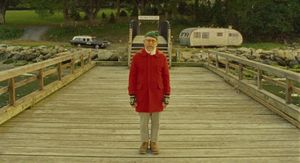
Anyway, shit bro, the leader of Camp Ivanhoe is Scoutmaster Ward, who is played by Edward Norton and get this, there's a narrator played by Bob Balaban. Bet you weren't expecting that. I bet you were expecting Edward Norton to play the nameless narrator, since he's good at playing those characters as evidenced through the film Fight Club, because he...oh no. I just broke the first and second rules of Fight Club. I'm going to get shot through the forehead for this.
Edward Norton, yeah. Remember when he played that Nazi in American History X? Okay, I haven't seen American History X either. And remember when he was in Primal Fear? Fuck! Edward Norton is a potty-mouthed version of Dustin Hoffman. Actually, no, he isn't. That makes no sense.
But like I was saying, American History X. Haven't seen that movie but it's definitely on my to-do list. I heard Ethan Suplee is in it. What? You don't know who Ethan Suplee is? He played Randy in My Name is Earl. Look, I know I promised I wouldn't talk about My Name is Earl again after I made the 30 Rock article, but I have to talk about it here, because it is detrimental to the point I'm making. I love Ethan Suplee in My Name is Earl. I mean, a slow-witted brother named Randy? That served perfect comic relief for the more serious episodes of the show. Plus, My Name is Earl just has that great warm and cozy feeling that no other show (besides Scrubs) can give you. In fact, I think I'm going to watch some of the episodes of MNiE I TiVoed right now just to make a point. So in the words of Ken Jeong, "Bye bye gay boys."
Okay, I'm back from an episode of My Name is Earl and I'm sticking by my opinion that it's great. It has a great main cast and a lovable supporting cast, including the fun-to-pronounce Nescobar A-Lop-Lop, who I assume, from the last name of the actor who played him, is Senegalese. God, why did NBC have to cancel My Name is Earl? WHY? And why did NBC have to cancel Chuck? WHY? WHY! WHY, GOD! My Name is Earl was my Thursday night and Chuck was my Friday night. Fuck you, NBC! Fuck you, you goddamn fucking dolphin fucks! I have to cry for a moment.
Anyway, I'm back. Now, as I was saying, I...I, damn am I horny for no apparent reason. And I can't focus. And I'm horny. And I can't focus. And I'm horny. And I'm unfocusable. Excuse me again a moment.
Okay, I'm back, you fat sluts. Now, like I was saying, sure I might have misused the word detrimental, but at least I know how to spell detrimental. That's right. I'm using the word detrimental in an Uncyclopedia article to teach you assholes how to spell, even though I said that I'm doubtful you know how to read in the section on the Life Aquatic. In fact, let me double check. Yup. I misused the word detrimental. Detrimental means negative. The word I meant to use on the paragraph on Ethan Suplee, who is not to be confused with Ethan's Supply Store, was crucial. What I meant to say was "Look, I know I promised I wouldn't talk about My Name is Earl again after I made the 30 Rock article, but I have to talk about it here, because it is crucial to the point I'm making." Crucial. That's the right word. You fucking monkey queers.
Also, I bet you were thinking American History X was the name of a porno before I told you. No, it's not a porno. Just because a movie has the letter X in its title doesn't mean it's a porno. Excalibur. Pineapple Express. Taxi Driver. Mad Max. Texas Chainsaw Massacre. Sex, Lies & Videotape. Xanadu. Yeah, Xanadu isn't a porno. It just sucks, and not in the porno way. And Sex, Lies & Videotape isn't a porno either, although I could understand how you can be misled by the title. If you want to know if a movie is a porno, check to see if it has three X's in its title. For example, Exxxcalibur. Spineapple Sexxxpress. Taxxxi Rider. Bang Hard Maxxx. Sexxxas Sexxx Sexxxacre. Sexxx, Lies, Million Dollar Lawsuit & Internet Leaked Videotape. Xxxanadu. See the difference, motherfuckers? Also, you can spot out a porno if it has the letter A in its title. Caligula. Salo. A Clockwork Orange. Trash Humpers. Human Centipede. Saw. A Serbian Film. But just because a movie has the letter A in its title doesn't always mean it's a porno. For example, Big Trouble in Little China, Citizen Kane, Planet of the Apes, Casablanca, Three Men and a Baby, Excalibur, Pineapple Express, Taxi Driver, Mad Max, Texas Chainsaw Massacre, Sex, Lies & Videotape, Xanadu, American Graffiti, The Last of the Mohicans, Batman Begins, The Dark Knight, The Dark Knight Rises, Rain Man, The Usual Suspects, Jaws and The Last Picture Show just to name a few. By the way, don't watch the Last Picture Show. It is NOT WORTH YOUR TIME. I had to suffer through it and I'm sad that I watched it because it took an hour and a half for a story to develop and when there finally was a story, there wasn't really much of a story to be told. I can't believe that people called it a cinematic masterpiece. Cinematic masterpiece my ass! I give this black and white piece of icicle tits zero stars! You fuckers.
Damn it. I was led to a Wikipedia article mistakenly thinking it was an Uncyclopedia article. That's good satire. It got me good. But don't fucking do it again.
9,449 as of April 19, 2014. Let's keep this damn thing in check. Let's see how much it is by April 19, 2015. I started off with 55 and now I have 217 and plan on having at least 350, maybe 450. Nobody knows what the hell I'm talking about. I don't even know what the hell I'm talking about.
Speaking of shows that give you a warm, cozy feeling like My Name is Earl and Scrubs, have you ever noticed how much the janitor from Scrubs looks like the dad from the Middle? Right?
You asses aren't listening. I'm going to stuff my face with some pound cake.
I'm not a perfect Persian...
Whoa. *scrolls up* I got way the hell off track. Well, there's not enough room on the rest of this section to discuss the rest of Moonrise Kingdom so if you absolutely, absolutely need to find out what happens, read this. It might be about Aladdin but Aladdin is good. And wouldn't you rather read about a nominee for the 1992 Oscar for Best Feel-Good Movie than read about some dull white-ass Wes Anderson movie? Aladdin actually probably would've won the 1992 Oscar for Best Feel-Good Movie had it not been for Wayne's World. But don't get me wrong, I totally, totally, totally love Wayne's World, it's like Mean Girls but for meatheads like me. In fact, I probably could write an entire article about Wayne's World and talk about its greatness, which I would often have to go into older tongues to describe as there are many moments of such grandeur that no English words could describe them, but potentially Turkish words could describe them. You know, those Turkishes are pretty trendy. Either way, both Aladdin and Wayne's World are great and the competition for the Best Feel-Good Movie Oscar in 1992 was fierce. The competition in 1993 was also somewhat fierce. The Sandlot was the obvious choice, but So I Married An Axe Murderer also had a good chance of winning. Anyway, long end of the short is this: Don't watch Moonrise Kingdom; watch Aladdin instead!
The Grand Budapest Hotel
I have great recent memories surrounding this film. On the day we went to see the movie, Pat and I rode a city bus to the movie theater downtown. Since we were almost about to miss the show, we ran really fast. Insanely fast. If you saw us from far away, you might have thought we were running to steal your girl. ...You should have seen how fast we were running. It was crazy. What? Do you not believe Pat and I ran so fast that we could have had the potential risk of being run over on our way to see Grand Budapest Hotel? Fine then. If you don't believe me, fuck you.
Anyhow, here's the 49-7-G on Grand Budapest Hotel. First of all, your preconceived notion (and trust me, it was mine's too) is that this movie is set a hotel in Budapest, Hungary. You'd be wrong, but it's okay, I'll let this one slip — unlike the running part. The movie is actually set in a fictitious European country named Zubrowka.
Now this is where it gets confusing. The movie starts with a girl kneeling next to a statue of a man named "The Author." She then reads Grand Budapest Hotel, which is first narrated by the Author, then from the POV of Monsieur Gustave H. (Ralph Fiennes), but then the torch is passed to Zero Moustafa, who as an old man is pasty but in his younger days was brown. That's a crazy nonlinear if I ever heard one. Now I know nonlinear is an adjective and not a noun, but I don't care. Here, the structure is so damn crazy that the rules of grammar no longer matter! This is a script flip inside a script flip seen through the eyes of a script flip in disguise.
Monsieur Gustave H. is quite the antihero. Okay, no he isn't, but he has a nasty thing for older women. Who wants to have sex with older women??? Don't answer that. Just let me puke because that shit is fucking fucking nasty.
One of his favorite old women, expertly played by Tilda Swinton, croaks. Fuck! She's only 84 years old! Idiots. Anyway, Monsieur Gustave H. finds out that a pretty painting she owned was given to him. Yes!
So, Monsieur Gustave H. ran Grand Budapest Hotel back in 1932, which is no fleabag motel and it's no Best Exotic Marigold Hotel either. No, it's a classy fucking fucking hotel. Classy fucking fucking hotel.
The old woman — who has a name for certain, I'm just not going to fish around to find it, besides it's probably something stupid like Taxsalis — has some belligerent children who believe the stupid goddamn fucking picture belongs to them, so it sends Monsieur Gustave H. and the trusty then-lobby boy Zero Moustafa into a whirlwind adventure where Monsieur Gustave H. lands in jail and other crazy stuff.
As per the rules of good sportsmanship, Monsieur Gustave H. gives Zero Moustafa full permission to go for this girl who has a birthmark that looks exactly like Mexico. This shouldn't be a surprise since Monsieur Gustave H. wouldn't like this girl, because she's way too young and therefore probably not — as he might say in his ridiculous British accent — "dynamite in the sack."
What Monsieur Gustave H. and Moustafa didn't know at the time was that the son of the old woman hired out a hit man, played by Willem Dafoe, who has brass knuckles and deadly rings on every finger. This brings me to an interesting point. Which one of you would like to see Willem Dafoe play a Batman villain? Really? Just me? Okay. Another Wes Anderson frequenter I think would make a great Batman villain is Edward Norton. Okay, you got to tell me you'd pay big bucks (or sneak in) to see Norton play a Batman villain. WHAT? YOU DON'T KNOW WHO EDWARD NORTON IS? HAVEN'T YOU BEEN READING THIS ARTICLE AT ALL? I WAS RIGHT WHEN I ASSUMED YOU COULD BE ILLITERATE!
The bad guys die and everything is well in the end. There is ultimately a war that breaks out in Zubrowka and some stuff happens with some Nazi people or something. The Nazis die, hopefully. Anyway, Dafoe's character falls over a cliff and I assume he dies but we can't say that for sure. Anyway, the painting goes to the rightful owners, Zero Moustafa lives happily ever after, Monsieur Gustave H. lives happily ever after, the Author never returns to the hotel and the girl keeps on reading. Fuck. I guess the memories surrounding this movie weren't that great. But there was one line that really stood out.
Scenario: Dmitri, one of the dead old woman's sons, realizes Gustave H. has slept with her.
MONSIEUR GUSTAVE H.: I thought you said I was a fucking faggot.
DMITRI: You are, but you're bisexual.
Would it interest you to know that while in the movie theater, I noticed that everybody watching The Grand Budapest Hotel was white?
Zooming on ahead, this movie has in recent times won a Golden Globe and been nominated for 9 Oscars. Whether or not it wins a single thing, I can't tell ya, although it does have a few chances. Now I feel bad I didn't give this movie the honor it deserved.
Recurring motifs
Wes Anderson has many recurring motifs in his movies. Here are all of them.
Symmetry
Remember that Arcade Fire song "Supersymmetry"? No, of course you don't, that's because the dreadful track was five minutes longer than it should have (11 minutes too long if you're like me and disliked that song altogether). But anyway, Wes Anderson is a huge fan of symmetry and maybe supersymmetry. Every one of his movies usually features people and important objects at the center of the screen. If that wasn't enough, typically everything surrounding them is identical on the left side as it is on the right.
Don't believe me? Here's some proof.
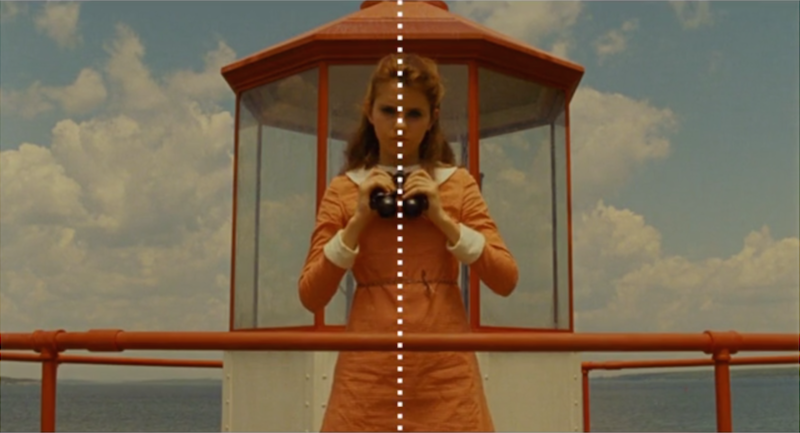
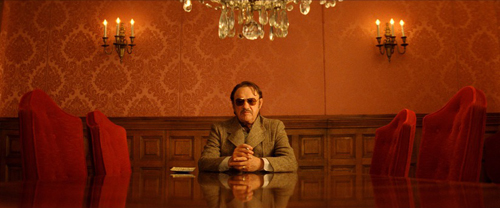
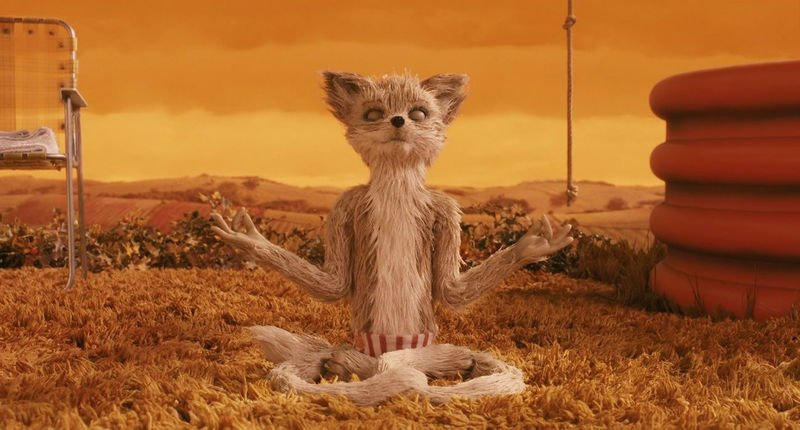
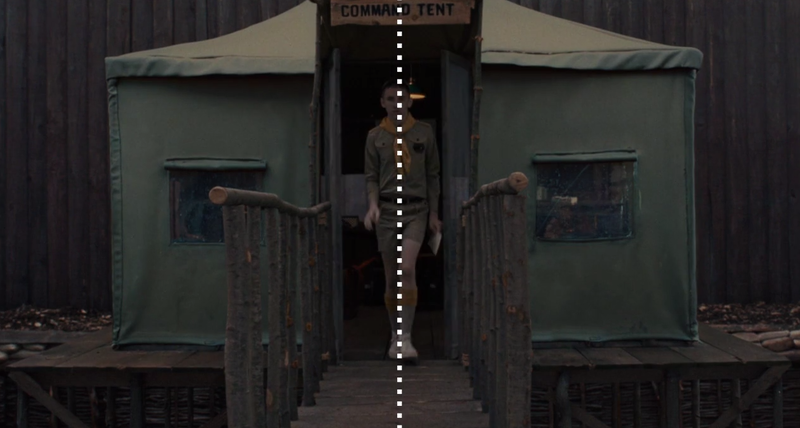
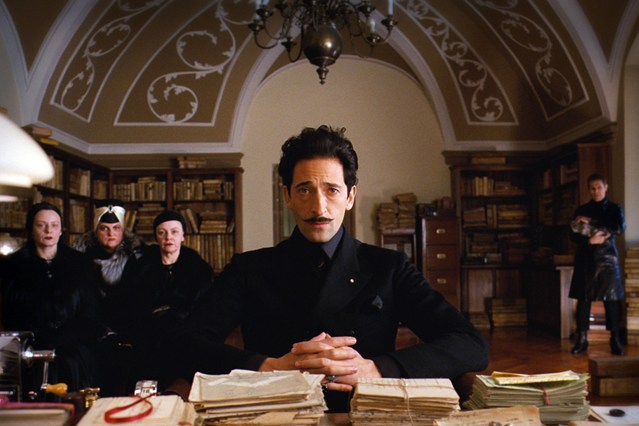
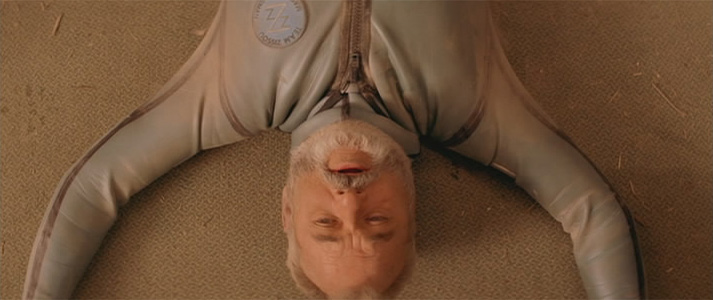
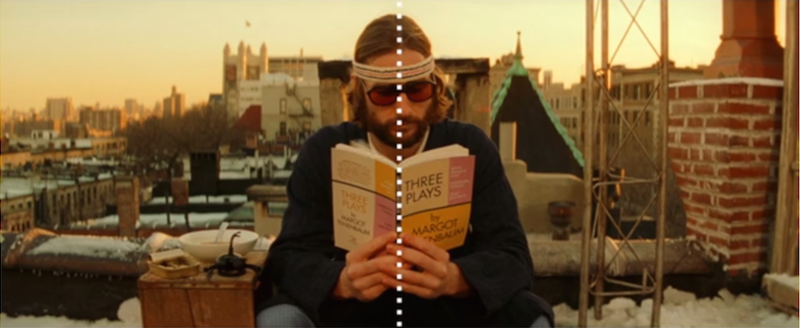
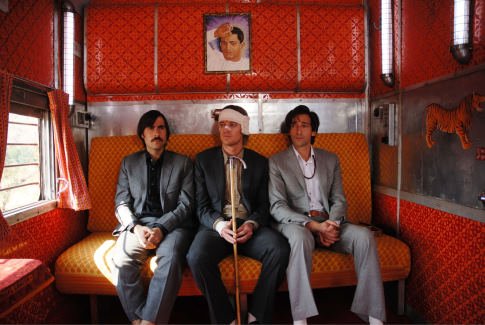
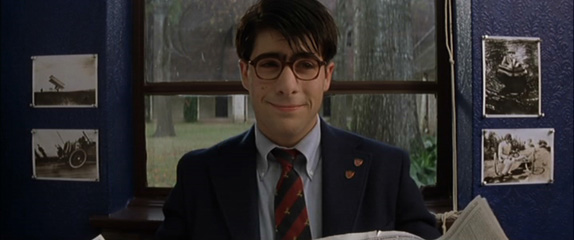
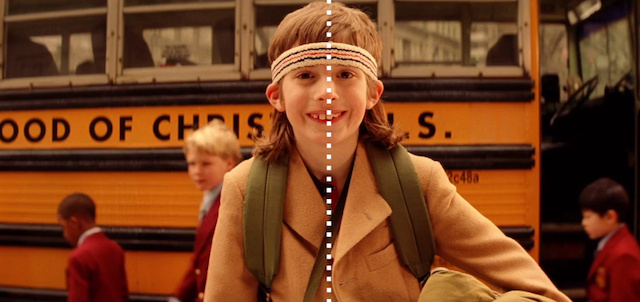
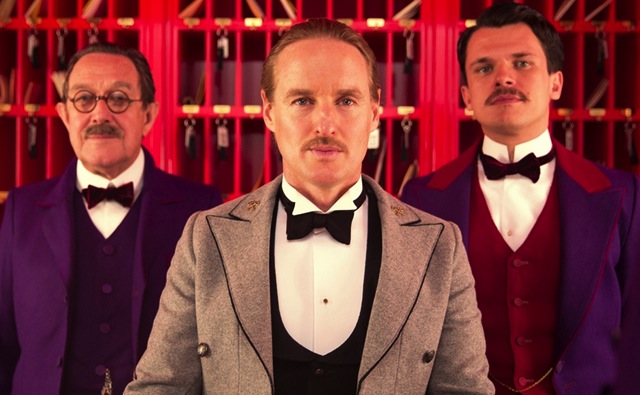
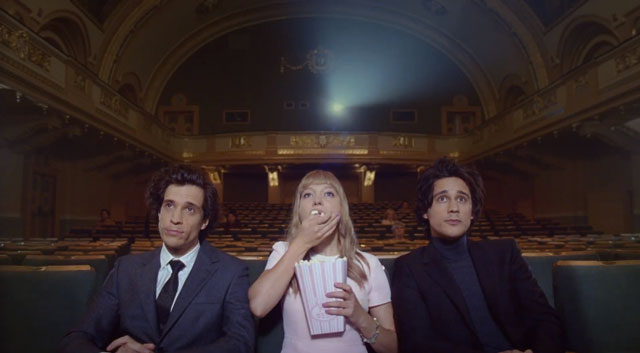
You get the point.
Use of rich colors
Remember that one commercial that showed the evolution of the Toyota Corolla and the final stage showed the modern-day Corolla and there are people doing the worm and shit in the street dressed richly in yellow, green and pink? Of course not, because you don't have to waste every second of your goddamn day thinking up obscure references to insert into your damned Uncyclopedia articles, do you? That's what I thought, so don't tell me I don't have a right to rant. You don't know how it feels!
Please come back. I didn't mean to get agitated like that. I'm just getting sick of being an Uncyclopedian. It doesn't matter. I'll be out of this business pretty soon anyway.
Yup, you heard right. I'm leaving Uncyclopedia. *white noise*
You didn't hear me? I'M QUITTING YOU FUCKERS!
I'm not going to tell you why here, I'll explain it in my personal farewell address, but trust me I got some good reasons.
Ahem. Anyway, so Wes Anderson is a huge fan of using rich colors. The most commonly seen colors in his films are the primary colors. You know, blue, red and yellow. Did you know that this article is the third article in my "Primary Color Trilogy," three loosely related Uncyclopedia articles I considered my magnum opuses? I think you know what the other two are, plus I'm way too tired of writing to even explain what the other two articles in my primary color trilogy is. But I'll tell you this: I'll tell you about it somewhere in my bibliography. This article is the yellow article in my primary color trilogy (even though this text is hot pink, this article just leaves a yellow taste in your mouth). And I've worked harder on this one than the other two, although not so far and pardon me for the Linkin Park reference but in the end it doesn't even matter. Fuck all, what was I saying?
Oh yeah. Wes Anderson likes to use rich colorful colors in his films, the most notable of which are blue, red and yellow. I had a picture in mind for this section but I couldn't find the internet. Be my guest if you want to do it for me...workshy jamrag munching chutney farmer.
Subtle inside jokes
An inside joke is a joke that is funny to a small group of people but a majority would not get. These jokes are usually formed in the moment and comes from "you have to be there" situations, often causing the humor to be tragically lost on those not there. For example, if I told the riddle of the Armenian little person, I'll find it funny but I know you won't because you weren't there when I conceived of this joke.
Anderson's movies are filled with inside jokes, oft not as edgy as the aforementioned, but they are filled with them. For good examples of inside jokes found within Wes Anderson's movies, watch the Life Aquatic, seeing as the movie's subtle inside jokes alienated its audience and received several death threats.
Quirky love affairs
This is one of the most common and universal themes in Anderson's work. Just as it is mandatory for Akira Kurosawa to put a comic relief character into his movies, it is mandatory for Wes Anderson to put a quirky love affair into each of his movies. This is most likely because Wes Anderson believes love is the most powerful thing in the world. I agree with him, but this is probably just because I have a crush on the sophomore girl who's half-Indian half-white.
Need examples? There is a quirky love affair between Luke Wilson and the Paraguayan maid Inez in Bottle Rocket, between Jason Schwartzman and Ms. Cross in Rushmore, between Luke Wilson and his adopted sister in the Royal Tenenbaums, between Owen Wilson and the British reporter in the Life Aquatic, between Bill Murray and the British reporter in the Life Aquatic, between Bud Cort and the British reporter in the Life Aquatic, between Jason Schwartzman and stewardess Rita in the Darjeeling Limited, between ? and ? in Fantastic Mr. Fox, between the boy and the girl in Moonrise Kingdom, between Ralph Fiennes (that's not the Shakespeare guy, right?) and the old women in the Grand Budapest Hotel and between Zero Moustafa and the girl with the Mexico-shaped birthmark in the Grand Budapest Hotel.
But let me make it clear that Wes Anderson didn't invent quirky love affairs. It's been in books long time. I checked out a book from a yard sale called Jubal Sackett. There might be a quirky love affair. There's a picture of what appears to be a mixed-race couple on the front, and the book's by a man named Louis L'Amour. L'Amour means "the love" so yeah, there could be a chance of a quirky love affair. Thanks for the yard sale, Mr. L! Thanks for books, Gutenberg! Thanks for having the instinct to follow in the path of a balloon, me!
Love. Love. Quirky love. This makes me want to break out into SONG!
UPTOWN GIRL! SHE'S BEEN LIVING IN HER UPTOWN WORLD! I BET SHE NEVER HAD A BACKSTREET GUY! I BET HER MAMA NEVER TOLD HER A LIE! I'M GONNA TRY FOR AN UPTOWN GIRL! SHE'S BEEN LIVING IN HER WHITE BREAD WORLD! AS LONG AS ANYONE WITH HOT BLOOD CAN! AND NOW SHE'S LOOKING FOR A DOWNTOWN MAN! THAT'S WHAT I AM!
Sorry about that. It's just when I talk about love, I feel this instinct to sing the second greatest song ever written. The greatest song ever written, of course, is the theme to Space Jam.
Bill Murray
While Anderson often uses many of his actors multiple times, a trade I like to refer to as recycling, his frequent use of Bill Murray is his most notable. The most logical explanation for Anderson's frequent partnering up with Bill Murray is that the two like each other. I assume there's no sorcery thrown into the mix. Either way, they bring home the bronze. Murray is Anderson's De Niro to his Scorsese, hopefully not his Kinski to his Herzog.
But Wes Anderson pretty much uses the same actor at least twice for one of his movies. I think it's in the actors' contracts ("if you agree to star in one Wes Anderson film, it is mandatory that you act in another one of his films in the future when the call comes up"). That explains why he keeps on using Adrien Brody even though nothing he could star in could be better than the time he had the greatest day in the universe. Man, that sure was a good day. I think I was getting my permit that day.
Brown people
When one watches one of Wes Anderson's movies, it becomes quite apparent that he likes brown people. But then again, so do most people except for the British and believe it or not Bobby Jindal. But who could blame Wes? I mean, brown people fucking rock! They gave us pajamas and shampoo. Okay, maybe I'm just saying that because I have a crush on the sophomore girl who's half-Indian half-white.
Regardless of any nonsense I might have implied, there is a brown person in every one of Wes Anderson's movies (he would get a token black guy but there is still yet to be a single black person who likes or has even heard of Wes Anderson), with Kumar Pallana in his early works and Waris Ahluwalia in his later works. I was originally going to say that Zero Moustafa was brown, but he's Guatemalan brown, so he doesn't count here because he's not the brown I was thinking of. What can brown do for you?
Cross sections
Wes Anderson enjoys cross sections. Cross sections are those things you find in those Kingston-Fischer books that show the parts of the inside of an object that you couldn't see from the outside although you're seeing it from the outside.
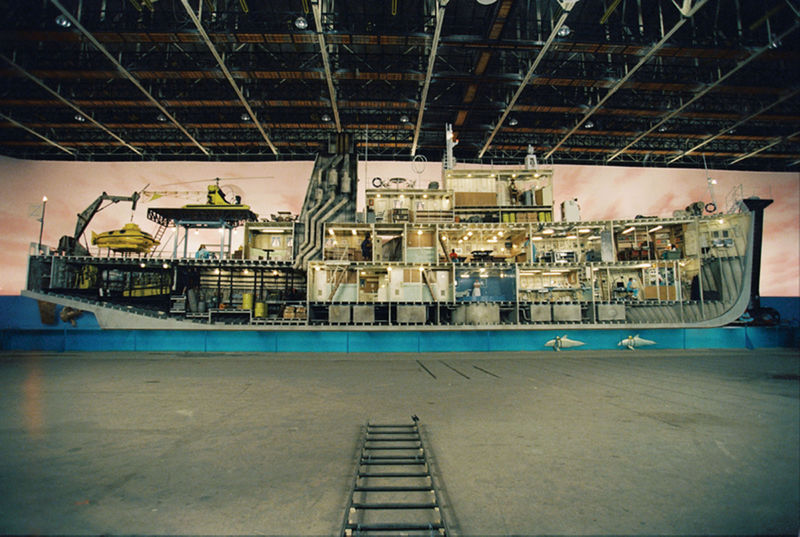
That is all I have to say for this area. Sorry there is nothing to humorous to say about cross sections. I have nothing humorous to say here except...geez, this is like that girl that ran away. Why did she run away? You, you don't know her.
Unexplained stuff going on in the background
This is probably the most beloved trait of Wes Anderson's movies; there's always something going on back there that nobody ever points out. For example, after the big play in Rushmore, we see Kumar Pallana playing with a piece of string in the background. What's he doing? Is he bored? Is he playing a game with himself? Who knows, and that's part of the fun. And in the Life Aquatic, there's the scene where we see Steve Zissou and Ned Plimpton shake hands and we see Willem Dafoe in the background, in character as Klaus, shaking hands with himself. I heard this is because Mr. Dafoe hates being in his trailer, but I'm not here to judge. Also, in the submarine scene of Life Aquatic, there's a sign in the background that says that the maximum occupancy of persons on this submarine should not exceed 6, but there are at least twelve people on board. Like I said before, not here to judge.
Unexplained stuff going on in the foreground
Main article: Subtle inside jokes
Also see that nonsense I said about Jason Schwartzman being barefoot in the Darjeeling Limited.
Splitting stories into chapters
Chapter I: I Explain
There was no way of them not knowing. A chapter. They have read many books, for sure. How could one not read a book? Whether or not it needed to be said, I explained to them what a chapter was and how Wes Anderson uses them in his films.
A chapter is a way of splitting a book into smaller sections so you don't have to go through the hell of one long, tiring 200-page bowel break without finding a place to stop. Wes Anderson is the director you are currently reading about. This section — in that way, I suppose you can say — is about how Wes Anderson has saved your bowels so you can pause the movie at the end of an interval, unless you're at a movie theater. The theaters won't wait for your bowels. Also, don't bring a book to the movie theater. People might think you're a terrorist.
Chapter II: Wes Anderson's Relationship
Some say Anderson met Chapters in a bar in 1996. Having finished Bottle Rocket, he wondered how he could take his next film higher from there. A struggling young filmmaker, he needed help from an outside source. The mysterious Chapters ordered a round of drinks. Anderson was intrigued.
"Who are you?" asked Wes Anderson.
Chapters replied, "The name's Books, Chapters Books."
Anderson lent out his hand. "Pleased to meet you, Books."
Anderson did not know this at the time, but his meet with Chapters that night was a meet with destiny.
Chapter III: Rushmore '98
After that fateful meeting in a bar in 1996, Anderson would not see Chapters for over a year afterwards.
It happened while he was on the set of his sophomoric effort Rushmore, and Chapters walked onto the set in the middle of a take. It was a damn tragedy that take has been removed since no photographs of Chapters Books exist, and while many assume he is nonexistent, like Mr. Senada, most just assume he is a fugitive who is on the run for slaughtering a stranger named Pants Mackenzie. You could ask Mr. Anderson what Chapters looks like, but no photographs of Anderson are known to exist either.
Chapters was asked to see a reel of Rushmore. This was initially assumed to be a mugging. Anderson was at first confused but then smiled and said, "Here's a reel of what we got so far." Chapters watched it and loved it but there was one thing that didn't sit well with him.
Said Chapters, "I watched, loved it, but there was one thing that didn't sit well with me."
Anderson asked, "What's that?"
Chapters replied, "I found the passage of time to be somewhat confusing. Perhaps you should state the start of a new chapter by saying the month and placing the month in front of a curtain closing or something like that."
Anderson took Chapters' advice to heart and that's why Rushmore looks the way it does today.
Chapters stood by as Anderson's assistant for the Royal Tenenbaums and the Life Aquatic. That's why the Royal Tenenbaums has chapter chapters and why the Life Aquatic has journal chapters, some people call them "dates."
Chapter IV: The Death of Mr. BooksChapters Books died in 2006 when he drowned in a freak accident in a swimming pool. Anderson originally resolved to split the Darjeeling Limited, the movie he was working on at the current moment, into chapters, but seeing that the spiritual journey of three unlike brothers was something that shouldn't be split into chapters, he didn't do that.
Also, Anderson didn't split Darjeeling Limited into chapters because he was imitating the styling of Satyajit Ray. You might not know that name (he wasn't the guy who directed Rebel Without a Cause, that was a different Ray), nor even care, but his films inspired the name of one of the greatest characters ever made, Apu Nahasapeemapetilon.
Originally, I was going to include that stuff about Satyajit Ray in the section on the Darjeeling Limited, but that section was long as is, and adding some extra words would really kill the 2,380-word-plus section.
Anderson felt bad, so bad he didn't dedicate Darjeeling Limited to Chapters, although if there was a scene where somebody got killed by a train, that surely would have been partially inspired by Chapters' drowning death.
Anderson might have got back in the habit in Fantastic Mr. Fox, but like I said in the section on it, I never saw the movie.
You can't tell whether or not Moonrise Kingdom is split into chapters because my interpretation of the film is about as reliable as Pi Patel.
Anderson makes a grand return or not to splitting stories into chapters in 2014 with Grand Budapest Hotel, which makes sense since the entire movie is actually out of a book an unidentified girl is reading.
THE END.
This section is dedicated to Chapters Books. 19??-2006.
Anjelica Huston playing detached characters
A lot of actors have characters they enjoy playing. For example, Sean Bean enjoys playing characters that die. A lot of directors have characters that they enjoy having their actors play. For Wes Anderson, he enjoys using Owen Wilson for playing characters with a stupid voice and he enjoys using Anjelica Huston for playing detached characters.
When I say "detached," I mean she is indifferent to the people who love her. This is obvious in every movie she's in. In the Royal Tenenbaums, she was indifferent toward Royal, and I was too at first but you learn to love him, much like Kevin Spacey's John Doe in Se7en. She is indifferent toward her husband Steve Zissou in the Life Aquatic. She is indifferent toward her sons in the Darjeeling Limited. She was indifferent towards nobody in The Grand Budapest Hotel because she wasn't in that movie, but I'm sure that if she was, she'd be one of the old women Monsieur Gustave H. had an affair with.
Obscure music
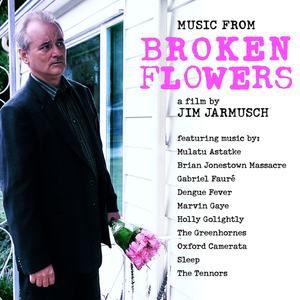
Tip: If you make your own Wes Anderson movie, always dig up the most obscure music in the world, i.e. b-sides, stuff from the Honky Continent that nobody's heard before, etc., etc. However, when doing so, pay close attention to the music's lyrics and see how well it underlines the story's plot. Also, check for anachronisms, we don't want another version of A Knight's Tale again, now do we?
If these tips don't help you, then I recommend you watch Broken Flowers, the Jim Jarmusch version of a Wes Anderson movie. It features obscure music, Bill Murray, aesthetic merit and a fair portion of love bullshit. Check that one out for further reference, as it as a Jarmuschian Anderson imitator.
Speaking of obscure music, I feel something strong coming on. Step back while I wow you with my baritone.
Don't pull your love out on me baby. If you do, then I think to maybe I'll just lay me down, cry for a hundred years. Don't pull your love out on me honey; take my heart, my soul, my money, but don't leave me here drowning in my tears. You say you're gonna leave, gonna take that big white bird, gonna fly right outta here without a single word, but you know you'll break my heart when I watch you close that door 'cause I know I won't see you anymore. Don't pull your love out on me baby. If you do, then I think to maybe I'll just lay me down, cry for a hundred years. Don't pull your love out on me honey; take my heart, my soul, my money, but don't leave me here drowning in my tears. Haven't been I good to you? What about that brand new ring? Doesn't that mean love to you? Doesn't that mean anything? If I threw away my pride and I got down on my knees, would you make me beg you pretty please?
And the song just kind of repeats itself with the chorus from there on out and there's also a bridge in there as well but it's not worth singing. If you want to learn who sang this, Google it. I'm not telling you. My obscure music is my obscure music. It doesn't belong to you.
Retrospective humor
“And even, forgive me, your father's misplaced wit.”
– Darcy
Do you know what retrospective humor is? You don't. You know what misplaced wit is? You don't. Well, they're kind of alike. Actually, no, not at all, actually, quite the opposite. I don't know what the hell I'm talking about.
Anyway, retrospective humor is a delightful look back at things of the past and distorting them in the frame of nostalgia, or something of that nature. I can't even remembered how I described it, but it was brilliant. Anyway, whatever retrospective humor is, Wes Anderson uses it.
Dysfunctional families
Like in the movies of David Lynch Tony Richardson, dysfrunctional dysfunctional families are a common occurrence. How common is it? Well, let's just say it's so common that any movie he's done about a family has been reviewed as "dysfunctional" and "brilliant in its madness" and such and such.
Give me a moment. I think I got the shimishanga shakes. Brrrrrrrr...
Here's the deal. I was never a big fan of Anderson using this as one of his motifs, as virtually every sitcom on every channel is about a dysfunctional family. Nobody wants to watch a family that always does right like Leave it to Beaver. Fuck beaver. Fuck it hard. Functional families are not good, dysfunctional families are good, Wes Anderson's dysfunctional families are...*holds arms out and moves them up and down as if they were a scale*
Anyway, the point I am making is this: while a lot of the stuff Wes Anderson does is original, focusing on dyscrunctional dysfunctional families is one of those cliches he should avoid. It's been focused on in movies and television since the days of the Harappan civilization of the Indus Valley and maybe even a little earlier than that. I think that focusing on dysmunctional dysfunctional families stopped being original after New Line Cinema released that one movie in 1991 about that same subject, I can't remember what it was called, I think it was Something Time or Something Place or Something House or Something Farm or Something Trade, I knew it had two words in its title and at least one of those words was a noun.
Since Anderson didn't release his first film until 1996, the gap between the start of his career as a filmmaker and the point at which dysfunctional families in film was something people stopped giving a shit about was five years. However, if he made it in television, then his safeguard as writing on dysfunctional families would be guaranteed until 2184, since that's when it will stop being entertaining in the four corners of the idiot box. I mean, who doesn't watch American Dad!? Only two types of people: Amish people and comatose people. I try to watch it all day err day. It's so damn good! I mean, sure Stan can be a bit of a douche but he's got a tool bag of CIA stuff, so he's all right. And Klaus, fucking Klaus. Not to mention that it's fun to watch what Roger's next disguise will be. Sure, Roger's a fucking sociopath and I don't like that, but his disguises make up for that. Remember the one episode where the prick Roger wouldn't sign Hayley's form for internship and Hayley disguises herself as Constance Mathers, a female lawyer? Roger later disguises himself as Dimitri Garabedian, a hired arm of the Armenian mafia (no pun intended) who claims to have killed Ms. Mathers. Hayley later gets back at Roger as Dimitri Garabedian by disguising herself as Mama Maroush, the matriarch of the Armenian mafia, although the disguise is unbelievably bogus and you can tell it's her because she didn't change her shoes.
Sorry about that rant. When I don't like a certain subject I'm talking about (which I might as well get used to since I plan on being a teacher someday), I like to change the subject to something I like. Actually, I take back my parenthesized statement. When I become a teacher, I'll change the topic from time to time for the kiddos' amusement. It'll make me teacher of the motherfucking year. Yeah, bitcho! Teacher of the year! I bet you're wondering what a bitcho is. It's a shortened of psycho bitch, bitch. But anyway sorry for talking about how I love American Dad! You could fill a book with that. In fact, I'm sure somebody already has. I won't (or at least try not to) go into an off-topic rant on cartoons the rest of the article. Just keep that joint away from me.
P.S. Nothing in this section had anything to do with the Armenian midget joke I did in the section on inside jokes. It was an inside joke about a classmate I had, whose name for her protection shall be protected.
Accents
Wes Anderson has characters with foreign accents in every one of his movies. Whether it's a Paraguayan accent in Bottle Rocket (much better than the Paraguayan accent Jon Voight "has" in Anaconda), a Scottish accent in Rushmore, a Baldwinian accent in The Royal Tenenbaums, a German accent in the Life Aquatic, an Indian accent in the Darjeeling Limited, an Australian(?) accent in Fantastic Mr. Fox, an unidentified accent in Moonrise Kingdom or a plain old English accent in the Grand Budapest Hotel, he always utilizes this to our observation and annoyance.
By the way, in case you're wondering, I put a question mark next to Australian for Fantastic Mr. Fox because I haven't seen the movie before so I wouldn't know if there's Australian accents in it or not.
Smoking
This is the least endearing characteristic of Mr. Anderson's films. Every one of his movies features at least one character smoking, which in some of his films is a huge plot point, in others it's just something there. But either way it's there mostly because some of the idiot characters in his movies don't know that smoking is for floppy fingered dogshit breathed shit sandwiches.
I'm sorry if I came across as harsh there, like a real big fat bottomed squeaky arsed blue-veined custard chucker, but anybody who chooses to smoke in this day and age is a sour faced pillow biting gay bear because only a downtrodden mouse fucking anal bandito would put his or her health at risk by lighting up. And anybody who thinks it's sexy is a filthy-minded happy clapping wizard's sleeve. Go ahead, hit me with your best shot, disgraceful donkey sucking custard dribbling ladyboys. Ha, that's what I thought, broke dick toddler mangling diseased cesspool. Lank greasy badly balding whore rapist! Cuntish cunt punching midget mutton dagger masher! Fake shit shoveling village idiot! Ha! You're right, I'm just doing this for fun now. But to you, Mr. Wes Anderson, don't feature smoking in another one of your movies, or else you'll be in big trouble from Mr. Rob Reiner. Anybody get it? Anybody get the oblique South Park reference?
Okay. Nobody does. Whale den... While it's assumed by some that Anderson features smoking in all of his movies because he wants to take our minds to a special time pre-1964 when everybody thought smoking was okay, I think he might be doing that because he thinks it looks classy, which it fucking doesn't.
Utterance of the phrase "You had me at Wes Anderson."
What the hell? This wasn't said in any of his movies!
Importance
Wes Anderson's films have been championed by many critics from many places, like New York City, London, Los Angeles, Zamunda, Wadiya, Freedonia, R'lyeh, Brigadoon, Zooropa, Stoolbend, Langley Falls, Quahog, Arlen, TX, Springfield, Shelbyville, Ogdenville, Capitol City, North Haverbrook, Brockway, Waynesport, Guidopolis, Little Pwagmattasquarmsettport, West Springfield, Lugash, Lilliput, Brobdingnag, Coneria and the most civilized neighborhoods of Cleveland. We'd say that they are also praised in New Penzance and Zubrowka but unlike the other places, we know for a fact that these places do not exist. Among the most praised techniques of his are his symmetry, his use of Futura font and his complete lack of Asians in any of his work, which is hard to come by. Even the 1961 flick Breakfast at Tiffany's featured an Asian.
His innovative films have been satirized in countless videos that have funny subtitles and cutaways to pictures of objects that are labelled in san-serif fonts.
His stuff was praised in the book Stuff White People Like, an entire book dedicated to things that one race of people that all look exactly the same like.
Also, a lot of his stuff have become part of the Criteria Collection or the Criterion Collection or whatever. You know it's that collection that have a bunch of overly pretentious bonus features that only an asshole faux cinephile with no trust in some things would buy. Of course, on the other hand, good people like Ron occasionally get movies from the Criterion Collection so I shouldn't be too harsh. They do make pretty tasty DVD cases.

